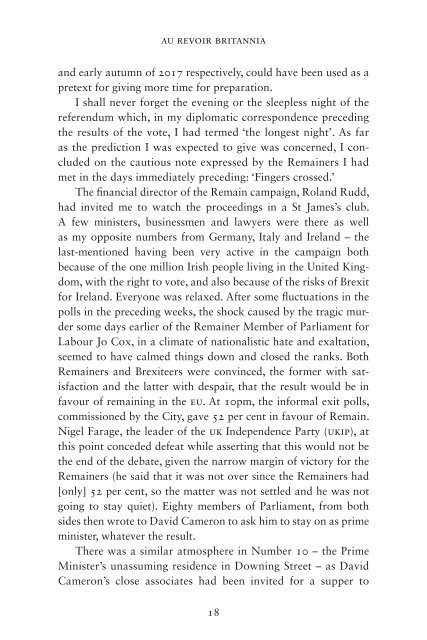Au Revoir Britannia by Sylvie Bermann sampler
From her unique perspective as former French ambassador to the UK, Sylvie Bermann examines the mistruths told by politicians surrounding the fateful 2016 Brexit referendum. Au Revoir Britannia asks the question ‘How did this happen?’ and exposes what she sees as the ‘unrepenting’ and ‘inveterate’ lies of the now pm, Boris Johnson. This first English edition includes a new preface exploring the future of post-Brexit Europe and Britain, and the uncertain implications of the Russian invasion of Ukraine.
From her unique perspective as former French ambassador to the UK, Sylvie Bermann examines the mistruths told by politicians surrounding the fateful 2016 Brexit referendum. Au Revoir Britannia asks the question ‘How did this happen?’ and exposes what she sees as the ‘unrepenting’ and ‘inveterate’ lies of the now pm, Boris Johnson. This first English edition includes a new preface exploring the future of post-Brexit Europe and Britain, and the uncertain implications of the Russian invasion of Ukraine.
Create successful ePaper yourself
Turn your PDF publications into a flip-book with our unique Google optimized e-Paper software.
au revoir britannia<br />
and early autumn of 2017 respectively, could have been used as a<br />
pretext for giving more time for preparation.<br />
I shall never forget the evening or the sleepless night of the<br />
referendum which, in my diplomatic correspondence preceding<br />
the results of the vote, I had termed ‘the longest night’. As far<br />
as the prediction I was expected to give was concerned, I concluded<br />
on the cautious note expressed <strong>by</strong> the Remainers I had<br />
met in the days immediately preceding: ‘Fingers crossed.’<br />
The financial director of the Remain campaign, Roland Rudd,<br />
had invited me to watch the proceedings in a St James’s club.<br />
A few ministers, businessmen and lawyers were there as well<br />
as my opposite numbers from Germany, Italy and Ireland – the<br />
last-mentioned having been very active in the campaign both<br />
because of the one million Irish people living in the United Kingdom,<br />
with the right to vote, and also because of the risks of Brexit<br />
for Ireland. Everyone was relaxed. After some fluctuations in the<br />
polls in the preceding weeks, the shock caused <strong>by</strong> the tragic murder<br />
some days earlier of the Remainer Member of Parliament for<br />
Labour Jo Cox, in a climate of nationalistic hate and exaltation,<br />
seemed to have calmed things down and closed the ranks. Both<br />
Remainers and Brexiteers were convinced, the former with satisfaction<br />
and the latter with despair, that the result would be in<br />
favour of remaining in the EU. At 10pm, the informal exit polls,<br />
commissioned <strong>by</strong> the City, gave 52 per cent in favour of Remain.<br />
Nigel Farage, the leader of the UK Independence Party (UKIP), at<br />
this point conceded defeat while asserting that this would not be<br />
the end of the debate, given the narrow margin of victory for the<br />
Remainers (he said that it was not over since the Remainers had<br />
[only] 52 per cent, so the matter was not settled and he was not<br />
going to stay quiet). Eighty members of Parliament, from both<br />
sides then wrote to David Cameron to ask him to stay on as prime<br />
minister, whatever the result.<br />
There was a similar atmosphere in Number 10 – the Prime<br />
Minister’s unassuming residence in Downing Street – as David<br />
Cameron’s close associates had been invited for a supper to<br />
18


















